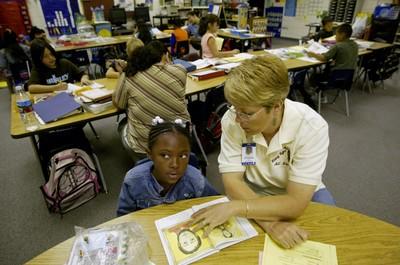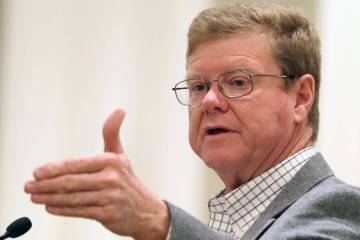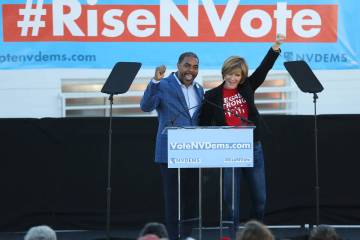Budget: It’s a deal
CARSON CITY -- The 2007 Legislature might not be headed for extra innings after all.
Gov. Jim Gibbons and most of the legislative leadership on Tuesday announced budget compromises on education and other major issues that had threatened to extend the session past its June 4 adjournment date.
The deal, which proposes no new taxes, includes expanding all-day kindergarten to 63 new schools at a cost of $15 million. The program is now in 114 schools. Much of the expansion would come in the second year of the budget.
Democrats had wanted full-day kindergarten in all 340 schools with kindergartens statewide.
The budget agreement also includes almost $10 million for an empowerment program at 29 additional schools statewide, at a cost of $400 per pupil, a program sought by Gibbons. The governor had originally asked for $60 million to implement the program in 100 schools at $550 per student.
The deal will also keep the state's modified business tax at 0.63 percent rather than see it rise to 0.65 percent on July 1.
Conspicuously absent from the announcement was Senate Minority Leader Dina Titus, D-Las Vegas, who said she wants to see more details before deciding whether to support the $2.3 billion in public education spending over the next two years.
The public schools budget must be approved by the Legislature before action can be taken on any other budget bills.
Disagreements over keeping the business tax at 0.63 percent and expanding all-day kindergarten had been major sticking points.
But the dollar value at the center of the debate was minuscule compared to the state's overall two-year, $6.8 billion spending plan.
For example, keeping the business tax at 0.63 percent was worth only about $18 million over two years. Spending on new public education programs increases by only about $63 million over the two years in the compromise plan.
In the final days of the budget impasse, the dispute focused on only about $4.5 million.
But the dispute was viewed by some lawmakers as a philosophical one, and not just about money.
Despite no commitment from Titus and her Democratic colleagues to support the agreement, Gibbons told a crowd assembled on the steps of the Capitol that there are sufficient votes to pass the spending plan.
Budget bills only require a simple majority to be approved.
"With this agreement, we are very likely able to conclude the legislative process on time as required by the statutes," Gibbons said.
Senate Majority Leader Bill Raggio, R-Reno, may have understated the past few weeks of closed-door negotiations when he said: "It has not been an easy process to get to this point."
"I will say everybody gave a little," he said. "While it isn't perfect, I think it is the nearest we can agree to."
Resolving the budget differences was exacerbated by less new revenue than was anticipated in January, Raggio said.
As part of the agreement, many of the budget cuts made to the Nevada System of Higher Education approved by Assembly Democrats were restored, including a 2.5 percent per year merit pool for professors that had been cut to 2 percent.
Gibbons won out on holding the business tax at 0.63 percent, although he originally wanted it lowered to 0.62 percent.
He won funding for his National Guard program for high school dropouts and for empowerment schools, although at a level less than originally requested.
One item, his request for a state fusion hub, where intelligence information would be gathered from around the state and disseminated back to law enforcement, was not funded. But Gibbons will be able to approach lawmakers with the proposal during the interim.
Assembly Speaker Barbara Buckley, D-Las Vegas, said the negotiations resulted in $63 million in new funding for public education, up from what Democrats said was only $13 million in new funding in Gibbons' original budget.
In addition to the new money for all-day kindergarten and empowerment schools, $7 million will be added for career and technical education, funding for gifted and talented students and money for after-school programs linked to student achievement, she said.
One other addition is $10 million for a pilot program of "pay-for-performance" bonuses for teachers that could be expanded in future years, Buckley said.
"Teachers are probably our most neglected resource in the state," she said. "We have some of the best ones in the country, and if we don't show them our appreciation why would they stay."
Everyone wanted more money for their own priorities, Buckley said.
"But in the end, if we finish our business within 120 days, and (with) a tax-free budget where we are increasing K-12 funding by over $63 million, improving our university system along with all the other measures that have been accomplished, I think we will have done well by our state," she said.
Assembly Minority Leader Garn Mabey, R-Las Vegas, said the Republican Assembly caucus also supports the agreement, especially the career and technical funding to help reduce the dropout rate.
Titus, who spoke from her office across the Capitol grounds, said the budget deal could be in some jeopardy if Senate Democrats decide not to support it, since some Senate Republicans are questioning the expansion of all-day kindergarten and could vote against the bill.
"We appreciate the hard work that has been done. We appreciate getting that extra $4.5 million for education, but our caucus still has some questions about it," she said. "We think that education is still last, and we need to look at the possibilities of some additional funding because we believe the money is out there."
Titus said there may not be 11 Senate Republicans on board with the overall public education funding plan either.
Sen. Bob Beers, R-Las Vegas, one of the main negotiators on the budget deal, acknowledged that there is opposition to expanding all-day kindergarten among some Republicans in the Senate, where they hold an 11-10 edge.
Beers said some lawmakers believed it made more sense to increase teacher pay in the first year of the budget. Teacher pay is now set to go up 2 percent, but some Senate Republicans wanted it to rise to 2.375 percent instead. The added salary would have covered the higher cost teachers will pay for their retirement, he said.
"In the end, that's a small battle that Republicans lost," Beers said. "In the big picture, will we come around and vote for the budget bill? Probably."
Clark County School District lobbyist Joyce Haldeman said she was pleased with the plan presented Tuesday.
"Particularly with the resources available to them, they did a phenomenal job with the K-12 budget," she said. "Would we have ultimately liked more funding for education? Of course, but once again we see steady progress. Specifically, the increase in all-day kindergarten, we're delighted with that."
Haldeman also praised the funding for career and technical education, which she said "will really make a difference for our high school students," and the pay-for-performance pilot project.
"It's the very best we could have gotten out of this session," she said.
Lawmakers did not waste any time putting the deal into place.
The Assembly Ways and Means Committee approved the public schools and higher education budgets at a meeting later in the day.
Buckley said one of the issues that remains in flux is proposed spending on various one-shot items included in Gibbons' budget. Some of those items include $20 million over two years for the Nevada Cancer Institute and $10 million to the Lou Ruvo Brain Institute.
Review-Journal writers Ed Vogel and Molly Ball contributed to this report.
2007 Nevada Legislature
BUDGET COMPROMISE EMPOWERMENT SCHOOLS The agreement includes almost $10 million for empowerment programs at 29 more schools statewide. Gov. Jim Gibbons had asked for $60 million to implement the program in 100 schools. MODIFIED BUSINESS TAX The deal keeps the state's modified business tax at 0.63 percent. Gibbons fought an increase that would have seen it rise to 0.65 percent on July 1. ALL-DAY KINDERGARTEN The deal expands all-day kindergarten to 63 additional schools at a cost of $15 million. Democrats had proposed it for all 340 schools with kindergartens statewide. ANTI-TERROR FUNDING Gibbons' request for a state "fusion hub," where intelligence information would be gathered from around the state and disseminated back to law enforcement, was not funded.





























